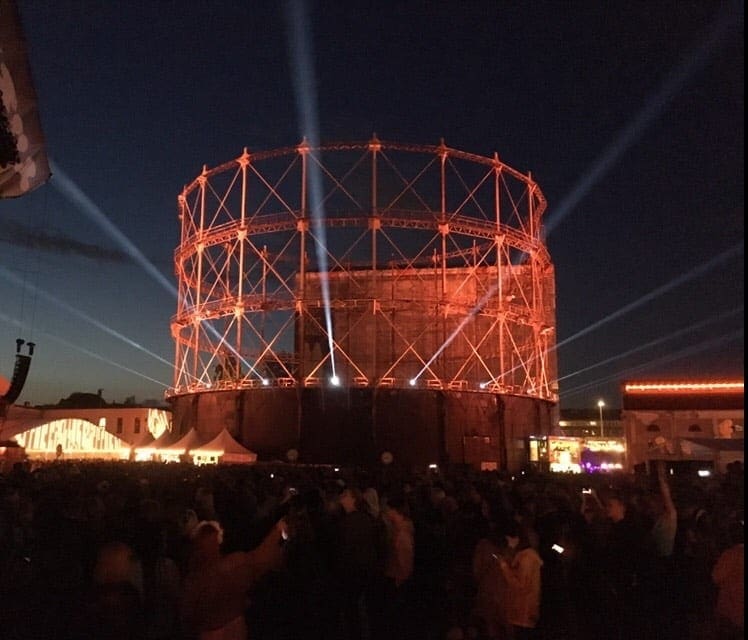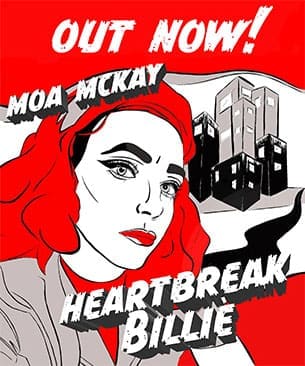Last weekend saw the fifteenth edition of Flow Festival – otherwise known as one of Europe’s most dazzing celebrations of music, art and culture, squeezed into a former power plant in central Helsinki.
Having never been to the Finnish capital before – or Finland itself, for that matter – this reviewer wasn’t really sure what to expect. After waking up at ridiculous-o’clock to travel from Berlin in time for the festival, it would be something of a mistruth to say I was in the mood for hoardes of drunken festivalgoers by the time we arrived at the site.
Fortunately, it just so happens that Finns are the friendliest people ever, and the volunteers and staff couldn’t have fit this stereotype better if they’d tried. We headed straight for the Nordea Globe Balloon- a quirky, spherical stage reserved only for the avant-garde. After happily stumbling across Elifantree (think early Björk, but with outrageously gnarly jazz-oriented midi sax solos to boot), it became immediately and abundantly clear that Flow isn’t your run-of-the-mill festival; it’s got a certain soul to it that’s difficult to put your finger on.
Post-mesmeric performance, we wandered over to the lush verdant paradise that is the Reaktor Backyard – a slightly mellower haunt for the more electronically inclined. Friday played host to some incredible talents; notably, Mafalda, Levon Vincent, and Fred P – although the list could be as long as my arm.
Exhausted from our ancient 25-year-old bones attempting to dance for a few hours, we found some respite in the adorable movie theatre, which showcased a collection of tried-and-tested classics alongside experimental shorts across the weekend. The Red Garden opposite was a celebration of the alternative – although it was tricky to actually get in, as the place was completely packed seemingly all day.
Sure, I could probably write a dissertation on the high quality acts who graced us with their presence over the weekend, but for the sake of this article, I’ll keep it short and sweet and stick to the highlights. Friday saw a mellow show from Ville Valo & Agents, whose packed-out performance in the Lapin Kulta Red Arena hinted that there’s a lot more to expect from the former goth-rock kingpin.
Later, the ineffable Erykah Badu took to the stage (after a solid set courtesy of Earl Sweatshirt) – and we realised straight away why she’s such a revered figure in the world of neo-soul. Snazzy bottle-cap hair briefly excluded, her performance was meditative and totally self-aware. It’s always tricky to achieve a good mix at an open air event, so on occasion it was difficult to hear the percussion section – but Badu’s earthquake-inducing vocal range more than made up for this.
Friday’s headline act came in the form of Solange, whose command of the stage was pretty solid indication of her years of experience in the industry. Having substantially evolved from her pop-oriented R&B roots, her set was contemporary and slick, armed with a plethora of clean lines and fiery backing dancers. There was a sense of continuity underlining her performance; the striking brass motifs cemented her position as one very aware of her identity.
Saturday gave way to a couple of slightly more experimental acts – namely, the NYKY Ensemble, whose intelligent rendition of the early works of the incomparable John Cage left the audience utterly captivated. Additionally, the Tristero Piano Trio knocked the proverbial ball out of the park, and Jaakko Eino Kalevi’s unique sound left earworms crawling around inside our heads all day.
Frankly, this reviewer thinks that it’s something of a crime that Seinabo Sey wasn’t billed as a headliner this year. The Swedish-Gambian vocalist’s set was the hands-down highlight of the festival, full to the brim with soulful melodies, rich harmonies, and perceptive and witty lyrics. Despite her knockout vocals, Sey held the air of a humble figure, seemingly hugely grateful for this year’s promotion to the Main Stage (she graced a smaller tent last year). Giving her talented trio of backing singers their chance to perform solos was totally decent of her, and her infectious laughter and warm personality left the whole crowd smiling. Of course, she’s already something of world-renowned musician, but I can’t help but feel she’s still got more to give, so watch this space.
Following Sey’s powerhouse set, we were treated to a performance by the impeccably cool Nubya Garcia. Her curious take on neo-jazz is certainly something to pay attention to, and to say we weren’t let down would be an understatement. It was standing room only at her stage – for obvious reason.
One point I feel is important to take note of is how refreshing it was to go to a festival where the lineup is dominated by women, and black women in particular. Sure, seeing more ladies recognised for their talents and gaining these coveted slots is always a good thing, but without intersectionality, what’s the point? There was a lot of love in the room for these exceptional artists, so fingers crossed other festivals will pay close attention to the precedent Flow has set.
After a brief (but necessary) rest for our feet in the cinema to catch a couple of short films, we headed back out to catch ALMA – Have U Seen Her?, who’s been gaining a fair bit of buzz in the nordic scene recently. I’m afraid that her music wasn’t exactly to this reviewer’s taste – but I guess I’m just missing something, as she drew one of the biggest and rowdiest crowds of the festival. Maybe I’m just a bit past it (at 25) to enjoy all this youth music – I’ll stick to my knitting and slippers for now.
Songwriter and vocalist Blood Orange treated us to a deliciously smooth and deeply personal set, before we headed back over to the main stage to cach Saturday night’s headliners Tame Impala. As these guys don’t require any introduction, I guess I could talk you through the totally mesmeric visuals (not sure who the relevant lighting designers are, but they deserve a substantial pay rise). Their show was laid-back and technically flawless, featuring hit after hit, to the delight of the adoring crowd. If you ever get the chance to see them in a town near you, I implore you to grab it with both hands.
(We tried to see Robyn, but her placement in a tent left something to be desired, and due to the hordes of festivalgoers and questionable mixing, her set was almost impossible to see and/or hear).
As is protocol at all outdoor music festivals, the final day was slightly marred by torrential rain. Regardless, Sunday service came courtesy of the violently sarcastic and effortlessly charming Father John Misty. Rancid humidity aside, his set bordered on perfection, reeling through his extensive back catalogue with a tinge of charistmatic purity.
Sunday’s final act on the Main Stage came in the form of The Cure, with King Of The Goths™ Robert Smith the chattiest I’ve ever seen him (i.e. he said more than five words). Playing a marathon two-hour set, their performance was peppered with a great deal of nonchalance and ingenuinity. It’s hugely inspiring to see a band formed back in 1976 still going from strength to strength 43 years later – and we can’t wait to see what else they’ve got hidden up their sleeves.
In summation, Flow is the best, Helsinki is the best. Whilst the lineup for next year’s festival hasn’t been confirmed yet (patience), judging by the quality of 2019, it’s sure to be sensational, so keep your eyes on the Flow Festival website for more updates.


